|
February 1755
|
Saturday 1 February |
 |
|
Brought by divine mercy to the close of another week in health, peace and safety, for which I desire to return my hearty praises to the Lord, especially in that he has strengthened _[my dear Polly] to go abroad after a long confinement. Much coldness in duty, two or three days past. Last night began to turn my thoughts towards the approaching season of communion. [1] Read Mr Halyburton upon self-examination; [2] though I have reason to charge myself with many of the sins he mentions, and many more, known to none but God and my own heart, yet I trust through Grace I am not a stranger to the covenant. I am desirous to accept the Lord Jesus upon his own terms. I hope I hate sin, as sin, and am desirous to be delivered from it at any rate, as the greatest of evils, and that I am heartily willing to renounce myself, and whatever at some times I am apt to call my own righteousness, and to accept salvation as the free gift of God in Christ and to embrace holiness not barely as a means, but as the end. This morning was enabled to enlarge in confessing my multiplied offences, and found some comfort in pouring out my soul in prayer. Afterward read his [Halyburton’s] chapter upon raising the affections. O may those motives be powerfully impressed upon my mind. Spent the day at Mr S_[Soan] [3] and am now returned to spend the evening in a farther preparation. Lord as thou hast given me the opportunity, and grace to lay hold of it, direct me to improve it for thy mercy’s sake. Amen. |
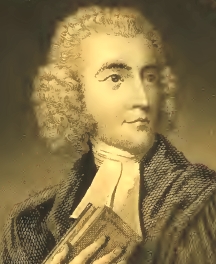
Thomas Halyburton
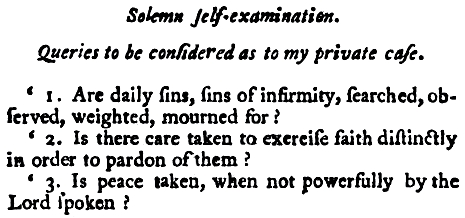 |
|
|
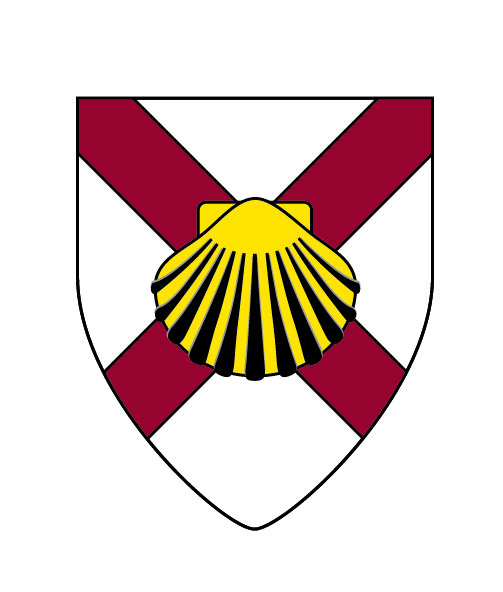
Jonathan Soan
Headmaster
of
King's School Rochester |
|
|
Jonathan Soan
married
Susannah Eversfield
(née Churchill)
sister of
Polly's mother
Elizabeth Catlett,
(née Churchill)
|
When Newton arrived in London in December 1758 with high hopes of being accepted for the ministry, his father-in-law George Catlett optimistically informed him that Soan had ‘talked of giving a curate £50 per ann - and a house’. However, before the week was out Newton had been firmly rejected for ordination.
Archbishop Secker in his Speculum describes Soan’s larger parish, Woodnesborough: ‘House very mean and let out to poor people’. However, of the smaller parish, Thurnham, it was said; ‘House pretty good’, and that Soan had done much work on it. |
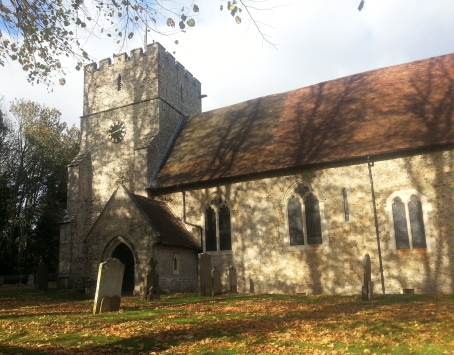
St Mary's church in Thurnham (Thornham) |
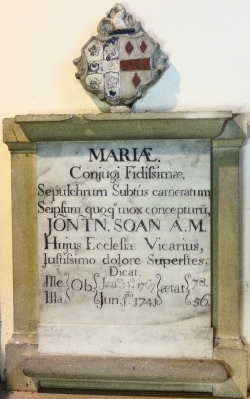 |
Jonathan Soan's epitaph above the vault
'which I prepared in my church of Thornham',
presumably when his
1st wife (Mary Richards) died.
His will was witnessed by George Catlett (snr), Eliza Catlett, & George Catlett (jnr) |
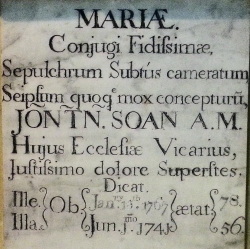 |
|
Sunday 2 February |
|
|
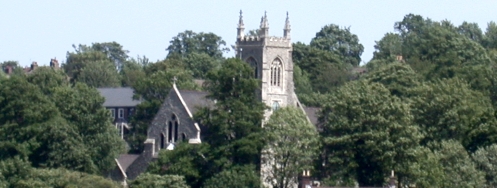 St Mary's Chatham
St Mary's Chatham
|
 |
|
Rose at 7, applied myself to beg a blessing upon the opportunities of the day, and I trust with some enlargement; renewed my Covenant with God in Christ, in the strongest terms I could then command, renounced anew the tempter, the world and the flesh. Assisted my meditations with MH [Mr Halyburton] [4] both at home and church. Yet when I came to communicate was very far from such a frame as I had prayed for. My spirit I hope was willing, but my flesh alas! how weak. The very cold weather had some effect upon me I believe; I was sadly absent in prayer, and the sermon afforded me no relief: a random harangue upon John 6:11,12 [5] without one gospel application or the least hint relating to the glorious service of the day. However, I humbly trust that I was in some measure enabled to see my title to the bread and wine, to remember and believe that Christ’s blood was shed for me, and to feed on him in my heart by faith with thanksgiving. In such case where there is a heaviness in me at receiving and a seeming unfitness, and unskillfulness in those who are appointed to dispense the Sacrament, I would bear in mind 2 Corinthians 4:7. [6] The blessing I seek is in the Lord’s hands, and he can impart it in what way he pleaseth, and by the most unsuitable Instrument. |
St Bartholomew's Chapel
Founded by Bishop Gundulph in 1078,
it became a chapel of ease to
St Mary's Chatham |
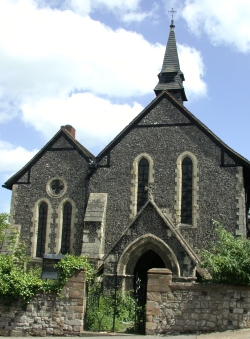 |
|
In the afternoon at Chapel [7] heard a sequel to Mr F’s [8] discourse on Psalm 119:67. [9] Lord teach my proud heart to submit to instruction, and to lay up useful truths wherever I find them; let me not be offended beyond measure. Yet surely it is my duty to stand up for the Grace of Christ and to dislike those who mention it not, or who explain it [a]way. O grant that I may be duly sensible of the great blessing of an experienced Gospel ministry. This one thing might I choose I would desire of the Lord, that I might be placed under such as teach and understand the truth as it is in Jesus; who in their degree can say with their great Master, We speak that which we know and testify that which we have seen. [10] Lord revive thy work in the midst of years: [11] pity the people who are destroyed for lack of knowledge. [12] |
Catlett Family Bible

22 January 1728/9 Old Style is equivalent to 2 February 1729 New Style |
|
This being the anniversary of _[my dear Polly’s] birth, [13] I desire to render my hearty thanks to our Gracious Lord for continuing all his mercies to us both thus far, for delivering us in all our fears, separations and sicknesses, and giving us the prospect of another year. O that this goodness may more powerfully constrain us to his service. Lord accept and inspire for thy mercy’s sake. Draw us and we will run after thee. [14] |
|
Thursday 6 February 1755 |
|
[the entries below, written on Newton's return to Chatham on 6 February 1755, refer to the previous few days spent in London] |
|
[Monday 3 February] |
|
Monday morning: went to London on horseback; dined and spent part of the evening with Mrs T[Thorpe]. [15] |
John Thorpe
druggist
(apothecary)
of Wapping
seems to have been a family friend of the Newtons for many years. |
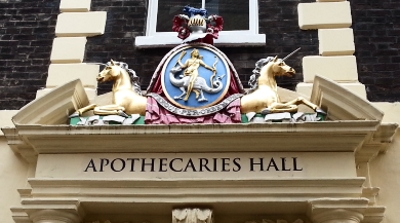 |
When one of the Newtons was in London, the other would use his address for letters. |
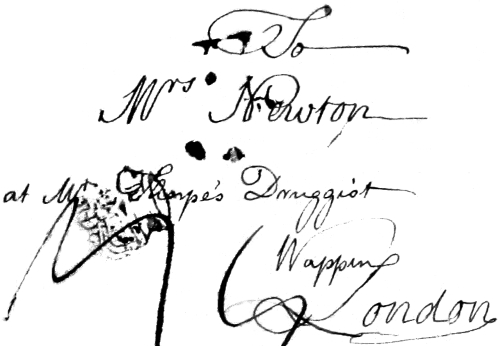 |
 |
Found SH [Sarah Harris] [16] greatly recovered from her late illness by the means of which there is hope she has been freed from her former disorder, after having in vain sought relief from the best physicians. I desire to record this as a wonderful instance of God’s goodness, and would humbly accept it as an answer to many prayers made on her behalf, that in a way of his own by a seeming death stroke he should work out her deliverance, when we had entirely given her over.
At seven went to the society meeting [17] at Mr May’s; [18] saw Mr Marshal. [19] After hearing and admitting a new member, the rest of the time was spent in prayer, chiefly with regard to Clunie’s voyage. [20] |
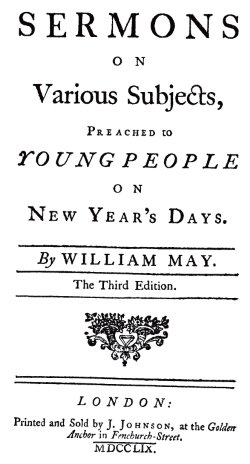 |
|
[Tuesday 4 February] |
|
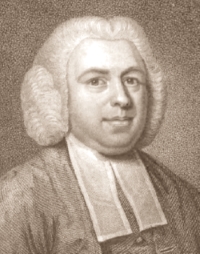
Samuel Pike (c.1717–1773) |
Tuesday morning – at Pinner’s Hall, [21] heard Mr Pike [22] on Luke 1:68: [23] an excellent doctrinal sermon, in which he stated the extent and permanence of the law as a rule, and that God’s mercy to us, did not consist, either in abrogating its power, dispensing with its requirements, or mitigating its excellency thereby to render it easier to us, but rather the law remaining in full force, God redeemed us by Jesus Christ, who suffer[ed] in our stead, for our breaches, and is our strength and righteousness, working in us by his Grace, an obedience conformable in our measure to his own, and acceptable to God for his sake, and in his name only. He afterwards showed how God glorified all his attributes in this wonderful contrivance, his wisdom, power, holiness and justice, truthfulness, and goodness, [24] and applied the whole, in a way of examination, of exhortation, and of consolation. Some remarks he made upon the form of expression in the text, I hope I shall not forget, though too long to recite here. |
Pinners’ Hall Court
Old Broad Street
|
|
Went from thence to the Amsterdam Coffee House, [25] passed an hour with Mr J_s, H_ywd, H_r_n and Clu, [26] discoursing chiefly of the good things of God. Concluded the evening with Clunie at his own house, [27] offered my humble prayers, in his behalf, for a blessing upon his voyage and concerns and circumstances, I hope with some warmth and enlargement, bemoaning likewise the face of the times, and entreating for sparying mercy to our sinful nations. |
Advert for
the Amsterdam Coffee House
in the Publick Adviser of London
May 1657
[the first newspaper advertisement
for coffee]
In Bartholomew Lane
on the back side of the Old Exchange,
the drink called Coffee,
(which is a very wholsom and Physical drink, having many excellent vertues, closes the Orifice of the Stomack,
fortifies the heat within, helpeth Digestion, quickneth the Spirits,
maketh the heart lightsom,
is good against Eye-sores, Coughs, or Colds, Rhumes, Consumptions, Head-ach, Dropsie, Gout, Scurvy, Kings Evil,
and many others)
is to be sold both in the morning,
and at three of the clock in the afternoon. |
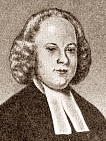
Samuel Hayward
(1718-1757) |
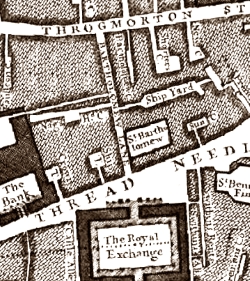
The Amsterdam Coffee House
Bartholomew Lane
behind the Royal Exchange
Threadneedle Street |
The Amsterdam Coffee House
was a regular meeting place
for evangelical dissenters
run by the Miss Boxleys |
|
[Wednesday 5 February] |
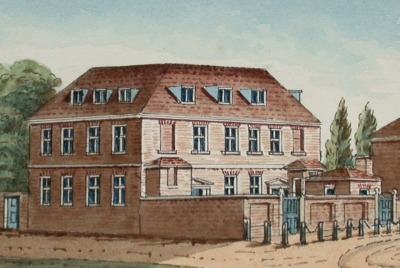
Stepney Independent then |
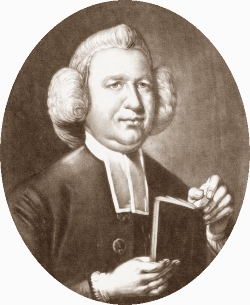
Samuel Brewer
(1724-1796)
Pastor of Stepney Independent Meeting |
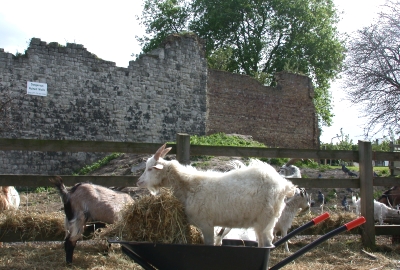
Stepney Independent now |
|
Wednesday morning: Went to see Mr Brewer, [28] who has been ill, but through God's goodness recovering again; stayed two hours with him, and loathe to part at last. I desire to praise God for the blessing of his acquaintance; methinks I am always remarkably lively, and clear in his company. Joined with him in morning service, and I hope my heart was touched with the affectionate manner in which he prayed for me and all related to me. |
|
At noon left London and got home at 5, [29] safe and sound, and found everything well. O my soul praise the Lord, thy always gracious preserver. The opinions and foreboding of many, and many good people, are, that troublesome times are appearing – whether it may be so or no I know not. When I think of our national abuse of mercies, I fear greatly, but I know that the Lord is gracious and merciful, and he has not left himself without a remnant amongst us, and if he puts it into their hearts to pray for our peace, I trust he will incline his ear to answer. [30] For my own part I desire and by his grace resolve to offer my mite, and to mourn daily for the evils I am not able to prevent. One thing I know, that happen what will, it shall be well with them that fear the Lord. His glorious name is a strong tower in the day of trouble and he knoweth them that put their trust in him. [31] Lord have mercy upon me and _[my dear Polly]; give us a timely knowledge of our saving interest in the Redeemer’s covenant that he may be unto us as an hiding place from the wind, and a covert from the tempest; as rivers of water in a dry place, and as the shadow of a great rock in a weary land. Isaiah 32:2. [32] |
 |
|
Saturday 8 February |
|
Upon summing up the circumstances of this week, I have much the same acknowledgements to make as the last: great mercies and blessings on God's part, great sins, and mistakes on mine. No extraordinary incidents have happened since I wrote the above. My frame has been variable, too often quite cold. The weather has been very severe, which has confined me within doors, and below stairs, and prevented me of improving my time as perhaps I might have attempted. I hope I can with humble comfort apply the Lord's gracious allowance to his dilatory, heavy disciples – the spirit indeed is willing but the flesh is weak. [33] I trust his Grace has made me in some measure willing, but O what a mixture of hardness and unbelief, how backward by nature, how are prone first to neglect, and then to seek and to rest in sinful excuses. Lord I disclaim all pleas but that of thy absolute mercy through Jesus Christ: pardon me for his sake, and prepare my heart to meet thee tomorrow in thy courts and ordinances. Amen. |
|
Sunday, 9 February 1755 |
|
Lost the improvement of my first morning hours, in a great measure through the extreme coldness of the weather. Blessed be God, for Mediator who knows and considers our infirmities. In the forenoon heard Mr M_l [Marshall] [34] expound Zechariah 9:12 1st clause, [35] PM at chapel Mr Frank [36] on Proverbs 20:9, [37] a text I desire to apply to myself. I am assured by my experience that evil mixes with all I do, say or think, [38] but through mercy there is a fountain opened for sin and uncleanness, and by this I trust to be cleansed from all impurity, gradually here, and totally hereafter. At 6 went to the Methodist Meeting, [39] heard Mr Webb [40] on Revelation 7:17. [41] |

'Mr Webb is gone'
Newton to William Bull
16 November 1782 |
James Webb (1708-1782),
then minister of Back Street Hitchin, preached in Chatham occassionally
in the Duer Schoolroom. |

'I loved and respected him greatly and thought him among the first, if not the very first, of his denomination. I thought him eminent, solid, humble, spiritual, peaceful in himself, and of course a friend of peace. Grace reigned in his heart, and out of the abundance of his heart his mouth spoke. He seemed to have no leisure to speak much of other subjects, and there was a savour in all that he said. I have lost for a season a valuable friend, but I hope by and by to see him again.'
|
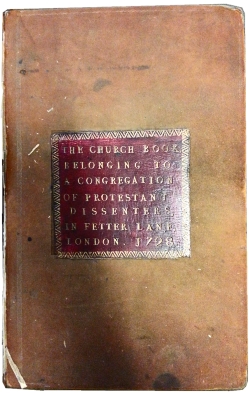 |
He was appointed pastor of the Independent church
in Fetter Lane
from 1758 until his death
in November 1782. |

[courtesy London Metropolitan Archives] |
|
I desire to praise God for the opportunity. He showed: |
|
1st |
in what respect Christ was called a Lamb: for his meekness, patience and innocence; for his usefulness, as we are fed by his flesh, and clothed with his righteousness; and for his sufferings when he was made a sacrifice for our sins. |
|
Secondly |
he spoke of his throne, as a throne of grace, power, glory, holiness, etc. He enquired how it was especially Christ['s] throne: it was his by promise from God the Father, [42] when he first undertook the work of redemption; he obtained it by conquest when he destroyed the work of the devil, and overcame all his and our enemies; it is his by purchase, for he paid the full price in his own blood, and died to live and to reign for ever. |
|
Thirdly |
he treated of that clause the Lamb shall feed them, under which he illustrated the provisions the Lord has given for the establishing and building up our souls: all the revelations of God, all the promises in the Scripture, all the actions, sufferings and glories of Christ, are so many different articles in the Christian’s bill of fare, if I may so term it. These provisions are free, rich, suitable, and dispensed by the Lord, in due proportion to the case of every believer: milk for babes, strong meat for strong men. |
|
Fourthly |
the fountains of waters, he enlarged upon in allusion to the known properties of water: the fountains of Divine Grace in Jesus Christ, have a cleansing, a refreshing, a strengthening and a healing quality. He is the true Jordan, in whom the most leprous sinners by bathing shall be healed and purged and become white as snow. |
|
Lastly |
he spoke encouragement from God's promise to wipe all tears from our eyes, to all the children of grace in trouble, whether through temptations, backslidings, desertions, or from afflicting providences. Let our state here be what it will here, we may rejoice that the time is short, and that no sin, temptation, suffering or sorrow, shall follow us into the kingdom of our Lord and Saviour. |
|
He concluded all with a warm and earnest application, chiefly to those who had not yet experienced regenerating grace, inviting them to come to the Lord Jesus with an assurance of fullness of pardon to the greatest offenders, and that whoever is led by the Spirit to lay hold of the good word shall never perish or be in any wise cast out. Lord grant this discourse may be useful to all who heard it, especially to us thy unworthiest servants. |
|
Monday 10th February |
|
In the evening heard Mr Webb again, upon Romans 7:4 [43] in which he discoursed: |
|
1st |
of the marriage with Christ, wherein it consists: it includes a renunciation of all pre-engagements; an acquaintance with Christ and a knowledge of his glorious properties, and entire suitableness; a firm consent on our parts, to close with him upon his own terms; and an experimental union with him, living by faith in his atonement and a dependence on his strength. |
|
2nd |
in what sense sinners are dead to the law, vizt [44] as a covenant of works; as the terms of our justification; as it is a curse and terror to offenders. We are dead to the requirements and the promises and the threats of the law, yet we are living to it as a rule of life, following it with a spirit of love and liberty in Christ Jesus – which led him, |
|
thirdly |
to speak of bringing forth fruits towards God. In this he took occasion fully to clear himself and the Tabernacle people or preachers [45] from holding the grace of God in wantonness, as if believing in Christ, as the only terms of salvation, gave encouragement to neglect keeping his commandments. In this view, he showed that all who did believe indeed and had found a work of grace in their hearts, were naturally acted [upon] by a divine principle of love to God and the Redeemer, to abound continually in good works, though they durst not rest in them: everyone that has this hope purifies himself even as God is pure. [46] To this I hope I can humbly give my experience. I can sincerely say, God forbid that I should continue in sin that grace may abound. [47] I hope I do not wish that the terms of salvation were altered, or that it was possible to be happy without being holy. |
|
His application was solemn and warm, chiefly to those who have not yet received the Gospel as the power of God. Lord grant thy blessing upon this and all other discourses of the kind, so far as agreeable to thy Divine Word. |
|
Wednesday 12 February |
 |

[1 February 1749/50 OS = 12 February 1750 NS] |
|
This day being the anniversary of my marriage, [48] in the morning I set myself to return my hearty thanks to Almighty God [49] for all the mercies and favours vouchsafed to me jointly and separately in that relation, bespeaking his farther blessing and directions that we may be enabled to improve it to our spiritual advantage. Afterwards renewed the same exercise. [50] Walked in the fields to enlarge my meditations. |
|
In the evening heard Mr Jenkins [51] of Maidstone, in the Schoolhouse, [52] a monthly discourse. |
|
He preached from Luke 7:42, 1st part, [53] from which after the order and explication of the context he raised three propositions: |
|
1st |
that all mankind are debtors to God's laws and justice, though not all equally so, some by sinning against greater light and advantages, or in a more aggravating and daring manner, or to a greater extent and degree are greater debtors than others – but the best and most plausible amongst men are still sinners, have come short of the glory of God and are liable to punishment unless satisfaction be made. |
|
2ndly |
All mankind are equally insolvent, there is not one that has a single farthing to offer in payment: neither good works, nor repentance, nor faith itself if considered as our act, can stand us in the least stead. With regard to works, we have all cause to say with Augustine: Bona opera mea, neque mea, neque bona sunt. [54] The good of our works is not our own but God's, and with the impressions of his grace we mix so much of our own evil, that our best prayers, are sins if viewed by God's strict justice. The true repentance not to be repented of [55] is an effect not a cause of God's reconciliation with us through JC [56] – and faith is more peculiarly God's gift, for no man can see the Saviour in his beauty, and sufficiency, nor their own want of him, till they are first enlightened from above; so that it is an act of free grace, to forgive the fifty pence as the five hundred. |
|
Thirdly |
that Christ is willing to receive all that come to him, and God is ready to pardon the greatest as well as the smallest debtors, as soon as they become sensible they have nothing to pay. Here he farther cautioned sinners against the gross and frequent mistake, of waiting till they can find some fancied qualifications of mercy: the forgiveness is frank and free, and that, because Christ has fully paid the whole debt. |
|
He concluded with suitable exhortations, inviting sinners to accept of the free grace of God, and saints to admire and extol it. Yet alas my heart was extremely cold and unfruitful under a display of that mercy of which (through grace) I have been so singular an instance. I was one that owed not a few pence but 10,000 talents, [57] the chief of sinners, [58] and I had if possible less than others to pay, not seemingly so much as an hour’s time to offer at a composition (page 82 [59]) and yet it has pleased God to speak peace unto me. Lord not unto me but unto thy name be the Glory and the praise. |
|
Twenty years later Newton wrote a hymn on this same text (Luke 7:42) |
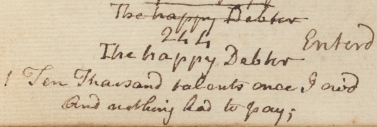 |
Ten thousand talents once I owed,
And nothing had to pay;
But Jesus freed me from the load,
And washed my debt away. |
|
Hymn No. 244 |
Olney Hymns, Book 3, Hymn 67 |
|
Saturday 15 February |
|
Thursday evening [13th] went to hear Mr Webb. [60] Discoursed on 1 Thessalonians 5:9,10,11, [61] which he treated in an expository way, enlarging upon every sentence of the text, showing God's gracious design towards his people, that he had not appointed them to wrath, but had found a means to redeem them from it (though they both naturally and actually stood exposed to it) but to salvation, to save them from the guilt, the punishment and evil of sin, from the power of the devil, from the works, vanities and temptations of the world. This he showed was effected by Jesus Christ, as having died for us, that is in our stead, warning his hearers against being led away by any doctrines that supposed a free will in man, or slighted the satisfaction and atonement of a Redeemer. He described living to Christ as a life of love, obedience, conformity, activity, yet a life of liberty, and though hidden to the world, yet full of joy and peace towards God. |
|
From the 11th verse he treated of the benefit of Christian conference, and communicating of experiences, which so far as I have been enabled to attempt, I can thankfully witness to with him.
I desire to praise the Lord, that of late I have had my mouth something opened, and been willing to declare what God has done for my soul, and am ashamed to think how long I hid my talent in a napkin and neglected to give God the glory of his free grace. My acquaintance with Clunie, [62] was greatly blessed to me in this point, and since, by his means, I have been brought to converse with many more excellent Christians, who have been I hope of great use to me, and from a knowledge of my circumstances have been led to glorify God on my behalf. [63] It is my judgement that societies formed on this view, will by divine blessing be abundantly useful, in promoting a spiritual and vital Godliness. I pray that I may always see it my duty to attempt the forming of such, or frequenting them when I have opportunity so to do. [64] |
|
Before sermon had some discourse in the vestry with three or four members of the meeting – all poor people and illiterate in the eyes of the world, but I have reason to believe they are rich in faith, learned in the Gospel and heirs of the promise. Such were the first followers of the Blessed Jesus. Many such have followed him in all future ages. To such it is the Father's good pleasure to give the kingdom, when those who are high in outward estimation – the rich, the learned, the wise and the mighty – can see no form or comeliness, or beauty in Christ that they should desire him.
Lord who am I that thou shouldst reveal thyself to me, [65] me who am less than the least of all thy mercies, me who was so long and so lately an apostate, a persecutor, and a blasphemer? [66] O my soul praise the Lord. |
|
Though I have enjoyed great advantages this week in point of ordinances, I cannot pretend my frames [67] have been suitably better, yet I bless God I have found more than once a comfortable liberty in prayer – and though I find much evil in my heart every day, I hope I do not live in known wilful sin of any kind. But were I to account for neglects and negligencies in duty, I must be undone; but blessed be God for the Lord Jesus Christ: to him and his righteousness I fly for recourse, that I may obtain pardon for the guilt of my nature and of my life, of the last year, of the last week, of this day, and even of this present writing. Lord forgive me all that is past, and prepare my heart for thy day, and all its glorious privileges. |
|
Saturday 22nd February |
|
I cannot well say how or why, my indolence has prevailed on me so far from keeping a diary daily, that I have wrote nothing during a whole week. This has been certainly a needless breach of a resolution I made not without sufficient reason and deliberation, [68] and as such I set it down amongst my many failings in duty. It will not be easy to recollect many particulars of this time, but in general I know I have been far from a warm, devotional frame through the whole. |
|
[Sunday 16 February] |
|
|
On Sunday morning I rid[rode] to Maidstone [69] for the sake of Gospel preaching; heard Mr Jenkins [70] fore and afternoon. His first sermon [was] on 1 Corinthians 10:1-5, [71] in which he showed at large the insufficiency of the best outward means, or the best outward attendance on them to constitute a real believer. He paraphrased in a warm judicious way upon the 3rd and 4th verses, [72] and from the 5th urged the duty of self-examination, that we are not deceived by resting in the forms of ordinances without the power. His second [sermon was] on Job 8:20, [73] from whence he described a perfect man, and in what sense man who is born in sin may be termed so – not personally perfect and free from sin with respect to the law, but he that by divine Grace is savingly renewed is perfect, as it stands in opposition to hypocrisy – perfect in all the constituent parts of the new creature, and especially perfect in the imputed righteousness of the Glorious Redeemer. Such as these (as the text says) God will not cast away.
His application was very suitable, both for comfort and advice – but I think for a great while past I have not been more trifling and dead, in the Lord's house and on the Lord's Sabbath, than I was all that day. Though my mind was several times strongly impressed with the thought I was in God's immediate service, and presence, yet I could not command my attention, much less raise my affections, either in prayer or hearing – so that my frailty greatly disappointed what was I hope the chief end of my journey, an expected opportunity of drawing nearer to God. |
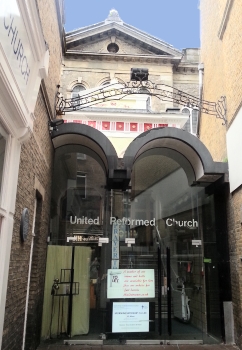
Week Street
now URC,
formerly the Independent church in St Faith's near the Cathedral
|
|
|
The rest of the week has been too much of a piece with the poor beginning – very little of the presence of God either in my duties or conversation – consequently little life, spirit or diligence in either. I know nothing that I have said or done for the glory of God or the good of my fellow creatures; surely I dare not say no opportunities have offered of either kind, had I been solicitous to improve them – too often I have been hasty and wishing, diffident of Providence, and disposed to resume a concern for those affairs, which I but very lately committed so solemnly into the Lord's hands. I have greatly wasted time, and given in to unnecessary and unsuitable indulgence. Alas my weakness! O this heart of stone, this cold, formal, sensual, deceitful, unbelieving heart. Sure all the dark part of the 7th [chapter] of Romans belongs in an eminent manner to me. And if notwithstanding all my vileness I have any interest in the beginning and the close of it, what a wonderful instance am I, both of the riches and the freedom of Grace. Lord thou canst and hast promised thou wilt bring good out of evil; grant that these my continual infirmities and sins, may render me lowly in my own eyes, and endear more and more unto my soul, that glorious truth that Christ is made sin for us, who knew no sin, that we might be made the righteousness of God in him. [74] Lord increase my faith and bless me with a renewed pardon of all my past follies, and grant that I may see thy power and glory in the sanctuary tomorrow. |
|
Sunday 23 February |
|
This day was twice at each meeting. Heard Mr M_ [75] on Micah 7:14 [76] and Mr Payne [77] from the Tabernacle [78] on Solomon's Song 5:2. [79] From both had much sound doctrine and useful hints, but delivered in a loose paraphrastical way, enlarging upon the several clauses of the texts, and applying them by way of allusion. I believe indeed that there are very few passages in the Old Testament which will not bear an allusive sense consistent with the tenor of the New, but in many places it requires a strong judgement as well as a devout frame, to trace them out clearly, and I must own I think well-meaning people do sometimes distort them a little, which I think was something the case today.[80] However, I had no cause to complain of what I heard; the grace and glory of the Redeemer was by both declared plainly enough, many useful observations made, and many comfortable texts enlarged upon. And though I must complain of daily infirmities, I hope my heart was not altogether unimpressed with this day’s service. But alas what vain wandering thoughts lurk within me in the most solemn concerns. Blessed be God I am sometimes enabled to renounce them and to mourn for them – get the better of them I cannot. Lord complete thy own work, in thy own way and in thy own time, and be the glory and praise thine only. |
|
Monday 24 February |
|
|
Nothing remarkable this day. After submitting myself to God and imploring his direction, I wrote a letter to Mr M_ [81] which has been in my mind some days since, and I desire to leave the issue of it with my heavenly Father who knows what is best for me.
My reading for several days past has been chiefly a new work of Mr Hervey's in 3 volumes [82] illustrating the wonderful works of Nature and Redemption, and displaying the Glory of the Lord Jesus Christ as the Maker of the world and the Saviour of sinners – chiefly enlarging and insisting on the glorious and comfortable doctrine of his freely imputed, and only justifying, righteousness – a truth of which (blessed be enlightening grace) I trust I am in some measure practically convinced, and whereon my whole soul desires to rest and build for here and hereafter. |
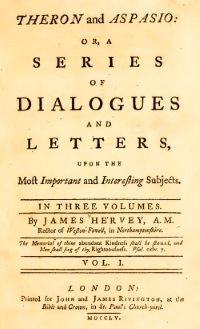 |
|
Wednesday 26 February |
|
The weather bad, have been confined mostly within doors; frame heavy for the most part, little heart towards devotion. My reading chiefly from Mr Hervey [83] and the Scriptures. Blessed be God his restraining grace and the retired life I lead, keep me much out of the way and temptation to known and wilful sin, but I fear I am a great waster of time.
In the morning I find myself sometimes in a spiritual temper[frame of mind], but alas like the morning dew it vanishes away. Spent the day at Mr S_[Soan] [84] – I may truly say spent it. |
|
Thursday 27 February |
At home all day, bad weather – morning exercises as usual, I hope with some enlargement. Wrote a letter to my friend and quondam Mate Mr W_[Welsh] [85] in answer to one I received on Tuesday, in which I endeavoured to speak a word of the good land, and to give my experience that the Lord is gracious, that his ways are ways of pleasantness, and all his paths peace. [86] [87] For so (I praise God) notwithstanding all my infirmities I have cause to say. My own unfaithfulness and unfruitfulness are sufficient to grieve me, but my Master is gracious, and his service in itself both reasonable and light.
 |
the African 1753 |
 |
Finished Mr Hervey's books, [88] on a cursory reading; shall wait another opportunity to go over them more carefully. I hope I am not an utter stranger to the principal subject, but I stand much in need of such helps to quicken my languid heart, and to invigorate my feeble faith. I hope this work will be blessed to many. [89] I am sure there are great multitudes though in an age and land of gospel light that have need of instruction in the first principles of the doctrines appertaining to the common salvation – many that under a profession of faith, have a name to live and yet are dead to the power of internal godliness and the real nature of a living faith in Christ Jesus. I offer my humble prayers, that by these and other such well-meaning, and well executed instructions, many may be brought to a clearer sense of their duties and privileges, and that it may be blessed to my own use and edification. [90] |
 |
Endnotes:
|
[1] |
Communion was celebrated in the Church of England on the first Sunday of each month. |
|
[2] |
Memoirs of the Life of the Reverend, Learned and Pious Mr Thomas Halyburton…with a large recommendatory Epistle by I Watts, Glasgow, 1756 (8th edition), p180, ‘Solemn Self-Examination’, where Halyburton lists ‘Queries to be considered as to my private state’. [ms: ‘S exam’ for ‘self-examination’] |
|
[3] |
‘Mr S’ is probably Mr Soan, Polly’s uncle Jonathan Soan (1690-1768) – Head Master of the King’s School, Rochester, curate of St Margaret’s Rochester, vicar of Thornham (Thurnham) and of Woodnesborough. Soan married the Newtons at St Margaret’s Rochester in 1750 (NS). He lived at the Kings School but spent the Whitsuntide vacation at Woodnesborough. |
|
[4] |
‘MH’ – presumably continuing reading ‘Mr Halyburton’, which Newton had read the previous day, 1 February |
|
[5] |
John 6:11,12 And Jesus took the loaves; and when he had given thanks, he distributed to the disciples, and the disciples to them that were set down; and likewise of the fishes as much as they would. When they were filled, he said unto his disciples, Gather up the fragments that remain, that nothing be lost. |
|
[6] |
2 Corinthians 4:7 But we have this treasure in earthen vessels, that the excellency of the power may be of God, and not of us. |
|
[7] |
St Bartholomew’s Chapel (cf Fn 25 from Sunday 26 January 1755) |
|
[8] |
‘Mr F’ was the incumbent Walter Frank (cf Fn 26, 26 January 1755) |
|
[9] |
Psalm 119:67 Before I was afflicted I went astray: but now have I kept thy word. (See 26 January 1755 for Newton’s comments on Frank’s previous discourse on this verse.) |
|
[10] |
alluding to 1 John 1:1-3 That which was from the beginning, which we have heard, which we have seen with our eyes, which we have looked upon, and our hands have handled, of the Word of life… |
|
[11] |
Quoting from Habakkuk 3:2 […] O Lord, revive thy work in the midst of the years, in the midst of the years make known; in wrath remember mercy. |
|
[12] |
Hosea 4:6 My people are destroyed for lack of knowledge: because thou hast rejected knowledge, I will also reject thee, that thou shalt be no priest to me: seeing thou hast forgotten the law of thy God, I will also forget thy children. |
|
[13] |
Polly (Mary Catlett) was born on 22 January 1728/9 OS – equivalent to 2 February 1729 NS. For an explanation of the Julian (Old Style) and Gregorian (New Style) calendars see time and date. |
|
[14] |
alluding to Song of Solomon 1:4 Draw me, we will run after thee: the king hath brought me into his chambers: we will be glad and rejoice in thee, we will remember thy love more than wine: the upright love thee. |
|
[15] |
Probably ‘Mrs Thorpe’. When Polly was in London Newton sometimes addressed his letters to ‘Mrs Newton, at Mr Thorpe’s Druggist, Wapping’ and vv. Possibly Elizabeth Thorpe, wife of John Thorpe the ‘druggist’ in Wapping. John Thorpe, son of an apothecary of the same name, was admitted to the Worshipful Society of Apothecaries in 1718. He later retired to Stratford Essex. Although John and Elizabeth Thorpe had at least 6 children, when John died in 1767 the only remaining family member in his will was their daughter Joanna, who was almost the same age as Polly. Letters from Newton to Miss Thorpe were published (two in Cardiphonia and one in Josiah Bull’s Letters). |
|
[16] |
This can probably be assumed to be the ‘S Harris’ in Newton’s diary entry of 3 August 1755. The will of Simon Scatliff who died in 1740 names two of his grandchildren as Sarah Harris and John Newton. |
|
[17] |
‘the society’ was comprised of members of Protestant dissenters of the three denominations – Presbyterian, Independent (Congregational) and Baptist – within twelve miles of London |
|
[18] |
William May (1706-1755), then assistant minister, with Joseph Denham, to the Presbyterian church meeting at Great Ayliffe/Alie Street, Goodman’s Fields, and formerly co-pastor (with Caleb Fleming) at Bartholomew’s Close (this latter reduced congregation had moved to Pinner’s Hall in 1753). May lived in Charterhouse Street. He published The Family Prayer-book (1743) and Sermons … preached to young people on New Year's days (1753). He was buried in Bunhill Fields. He was very wealthy, having South Sea annuity stock of several thousand pounds. His will lists numerous beneficiaries: friends, relations, servants, institutions and Christian organisations. |
|
[19] |
ms: ‘M_shal’ This seems to have been John Marshall of Chatham, for, a few days later, on his return to Chatham, Newton went to hear Marshall preach on Sunday morning 9 February at the Particular Baptists Meeting in the Dower/Duer/Doors Schoolroom, Whittles Lane, Chatham. Marshall had been licensed to preach as a Particular Baptist since 1741. Newton later (2 July) described Marshall as having ‘but very poor ministerial gifts’. |
|
[20] |
Capt Alexander Clunie (d. 1770), cf Fn 33 in January 1755 for some background to the danger of his voyage. |
|
[21] |
Pinners’ Hall, in Pinners’ Hall Court, Old Broad Street, had been hired for Sunday services by several Baptist churches, dating back to 1678. From 1704-1708 the church of Isaac Watts met here. Caleb Fleming was pastor of the Independent church meeting at Pinners’ Hall in 1755. Preachers at the Tuesday morning lectures, initiated ‘under the encouragement and patronage of the principal merchants and tradesmen’, had included Owen and Baxter. The lecturers were to consist of four Presbyterians and two Independents, who, in 1755, were: Samuel Pike (c.1717–1773), Samuel King (c.1715-c.1788), Richard Rawlin (1680-1757), Thomas Bradbury (1677-1759), Dr John Guyse (1680-1761) and Thomas Hall (d. 1762). The original hall was demolished shortly after 1798. |
|
[22] |
Samuel Pike (c.1717–1773) had studied under John Hubbard of Stepney. In 1747 he became pastor of the Three Cranes Meeting House in Fruiterers' Alley, Thames Street. He preached the Merchants’ Lecture on Tuesday mornings at Pinners’ Hall, and on Sunday evenings he preached at Little St Helen’s, Bishopsgate Street, with Samuel Hayward (1718-1757), on ‘cases of conscience’. Pike established an academy for training students for the ministry at his home in Hoxton Square. By 1753 he had adopted the principles of John Hutchinson. His 1755 treatise A Form of Sounds Words, on the Assemblies Catechism was commended, amongst others, by Thomas Bradbury, John Guyse and Richard Rawlin. After several years of considering Robert Sandeman’s views, Pike resigned in 1765 to join the Sandemanian society, who later sent him to minister to their congregation in Trowbridge. |
|
[23] |
Luke 1:68 Blessed be the Lord God of Israel; for he hath visited and redeemed his people. |
|
[24] |
These are assumed from Newton’s abbreviations: ‘his W, P, H & J, T – fullness, & Goodness’ |
|
[25] |
ms: ‘A_ Ch’. The Amsterdam Coffee House in Bartholomew Lane, opposite the east side of the Bank of England, behind the Royal Exchange and between Threadneedle Street and Lothbury, was a regular meeting place for evangelical dissenters. It could boast the first newspaper advertisement for coffee, which appeared in the Publick Adviser of London in May 1657. The Minutes of the Protestant Dissenting Deputies at a General Meeting on 12 March 1755 (their meetings were held at the Virginia Coffee House in Freemason’s Court, Cornhill and at Pinner’s Hall), quoting the Report of a Sub Committee on 7 March, investigating incidents at Woolwich, ‘A Letter was received from the Revd Mr Hayward which said the Gentlemen from Woolwich were waiting at the Amsterdam Coffee House and wondered that they were not called on.’ The elderly landlady of the Amsterdam, Miss Boxley, who ran the Coffee House with her sister, died in 1762. The Coffee House had ceased to function by the end of the century. |
|
[26] |
Probably David Jennings, Samuel Hayward, [‘H_r_n’ could be ‘Harrison’ or ‘Harrington’ ?], and Alexander Clunie. |
|
[27] |
ms: ‘Clu_’: Clunie, who then lived in Bird Street (now named Trench Street), Wapping, close to Newton’s childhood home in Red Lyon Street. |
|
[28] |
ms: ‘B_ r’: Samuel Brewer (1724-1796), Pastor of Stepney Independent Meeting. See Fn 12 of 20 January 1755. |
|
[29] |
Note Newton was riding a horse from London to Chatham – a five hour journey. |
|
[30] |
ms repeated 'ear' |
|
[31] |
Nahum 1:7 The Lord is good, a strong hold in the day of trouble; and he knoweth them that trust in him. |
|
[32] |
Isaiah 32:2 And a man shall be as an hiding place from the wind, and a covert from the tempest; as rivers of water in a dry place, as the shadow of a great rock in a weary land.
Newton preached on this verse in Olney on 5, 13 and 20 December 1767, and on 8 and 15 September 1776. His sermons may be read in 365 days with Newton (see 6-8; 13-15; 20-21 December), or online at www.johnnewton.org. See also a hymn on this text in his own handwriting at Harvard University: Hymn No. 197, ‘Jesus the King, Refuge, River and Rock of his church, Isaiah 32:1,2’, He who on earth as man was known, Olney Hymns, Book 1, Hymn 59 |
|
[33] |
Matthew 26:41 Watch and pray, that ye enter not into temptation: the spirit indeed is willing, but the flesh is weak. |
|
[34] |
Newton had met Marshall at the society meeting at William May’s on Monday evening 3 February 1755. A few days later then he attended Marshall’s Particular Baptist meeting in in the Dower/Duer School Room, Whittles Lane, Chatham to hear him preach. See Fns 19 and 64. |
|
[35] |
Zechariah 9:12, 1st clause, Turn you to the strong hold, ye prisoners of hope: |
|
[36] |
ms: ‘Mr F_’, cf Walter Frank, Fns 26 and 54 |
|
[37] |
Proverbs 20:9 Who can say, I have made my heart clean, I am pure from my sin? |
|
[38] |
This sentiment is echoed in Newton’s hymn ‘Lovest thou me?’, Olney Hymns, Book 1, Hymn 119 on John 21:16, ‘Tis a point I long to know – verse 5:
If I pray, or hear, or read,
Sin is mixed with all I do;
You that love the Lord indeed,
Tell me, Is it thus with you? |
|
[39] |
ms: ‘Meth Meet’: ‘Methodist Meeting’ (this was a group of methodists in Chatham chiefly identifying with George Whitefield) |
|
[40] |
James Webb (1708-1782). At this time Webb was the minister of Back-street, Hitchen. He had been a student at Moorfields Academy with many of those whom Newton met this year in London. Later he was appointed pastor of the Independent church in Fetter Lane. Newton maintained contact with James Webb until his death. He described their friendship to William Bull: ‘Mr. Webb is gone – fully ripe I doubt not, like a shock of corn in due season. I saw him two or three times in the former part of his illness – afterwards be was a while out of town and the first time I called after his return, he was too low to speak with me, and sent me his love and farewell by message, down stairs. I loved and respected him greatly, and thought him among the first, if not the very first, of his denomination. I speak not of him as a scholar or divine. He probably was not inferior to his brethren in these characters. I knew him chiefly as a Christian. As such I thought him eminent – solid, humble, spiritual, peaceful in himself, and of course a friend of peace. Grace reigned in his heart, and out of the abundance of his heart his mouth spoke. He seemed to have no leisure to speak much of other subjects. And there was a savour in all that he said. His manner of speaking showed that he knew himself. I knew no man who had less of what I call the Don about him. He shone without affecting to blaze or sparkle; and while others considered him as a teacher, he seemed to consider himself as a learner. In his last illness he did not speak of any remarkable consolations, but expressed an edifying, encouraging example of a calm, unshaken confidence in Jesus Christ crucified, as the alone and sufficient ground of his hope. I have lost for a season a valuable friend, but I hope by and by to see him again. Blessed are the dead who thus die in the Lord – they rest from their labours and conflicts, and are now before the throne.’ Lambeth Palace Library MS 3095, ff 147-8. See 10 Feb re his links with the Tabernacle circle and 15 Feb (for 13th) when Newton heard Webb preach in London. |
|
[41] |
Revelation 7:17 For the Lamb which is in the midst of the throne shall feed them, and shall lead them unto living fountains of waters: and God shall wipe away all tears from their eyes. |
|
[42] |
ms: ‘G the F’ for ‘God the Father’ |
|
[43] |
Romans 7:4 Wherefore, my brethren, ye also are become dead to the law by the body of Christ; that ye should be married to another, even to him who is raised from the dead, that we should bring forth fruit unto God. |
|
[44] |
abbreviation for the Latin videlicet, i.e. ‘namely’ |
|
[45] |
‘the Tabernacle people’ – those who attended Whitefield’s Tabernacle in London, then in Windmill Hill (now named Tabernacle Street – the actual site was on the corner of Leonard St, where there is still a commemorative plaque) |
|
[46] |
Quoting from 1 John 3:3 And every man that hath this hope in him purifieth himself, even as he is pure. |
|
[47] |
Referring to Romans 6:1,2 What shall we say then? Shall we continue in sin, that grace may abound? |
|
[48] |
John Newton and Mary Catlett were married at St Margaret’s, Rochester, on 2 February 1749/50 OS, equivalent to 12 February 1750 NS (this change of calendar styles was effected in September 1752). The marriage ceremony was conducted by Jonathan Soan, husband of Polly’s aunt Susannah. They probably lived afterwards in her (second) house in Five Bell Lane, Rochester. |
|
[49] |
ms: ‘Al God’ |
|
[50] |
Newton was probably referring to his diary entry of 12 February 1754: ‘I remember my reverend and good friend who performed the marriage ceremony, advised me, that day twelvemonth and every succeeding year, to read over the office of the Church, which we had then been repeating after him. He judged this might be a means of making me more careful in complying with my engagements, and in general I think his advice is good, and the lives of thousands wedded pairs, seem to argue that they have forgot what it was they vowed to each other.’ |
|
[51] |
Herbert Jenkins (1721-1772), a colleague of Howell Harris (1714-1775) and John Cennick (1718-1755), was a Welshman who was first an itinerant preacher with John Wesley’s society, then with Whitefield’s Tabernacle, and finally ordained pastor of an Independent chapel in Maidstone in 1749. Samuel Brewer received the confession of faith from Jenkins at his ordination there on 24 May 1749. Jenkins has a fine trail of approvals: John Wesley commended him for preaching ‘a plain honest sermon”; Howell Harris declared to George Whitefield: ‘Much does the Lord bless brother Herbert Jenkins”; Moravians described Jenkins as ‘a very solid man”, authors Joseph Ivemy and Aaron C H Seymore wrote that he had ‘lived usefully”, and laboured ‘with great zeal and success’.
An interesting turn of events occurred when this Independent chapel dwindled to only 20 members a few decades later, including some Baptists who preferred to receive communion from one of their own denomination, for the minister who came across to serve them was the tenant of the Catlett’s house, John Knot of Chatham (the house we presume John and Polly were living in at the time of the above diary entry). |
|
[52] |
The ‘Schoolhouse’ refers to a room owned by the Watts Charity (established under the legacy of Richard Watts of Rochester in 1579), leased to dissenters for meetings. It is referred to by several names: Duer, Dower, Doors. It was situated in Whittles Alley, off Globe Lane, Chatham. |
|
[53] |
Luke 7:42, 1st part, And when they had nothing to pay, he frankly forgave them both. |
|
[54] |
translation from the Latin: ‘my good works are neither mine nor good’, from Opera omnia, Volume 4, Part 2, Saint Augustine (Bishop of Hippo) |
|
[55] |
2 Corinthians 7:10 For godly sorrow worketh repentance to salvation not to be repented of: but the sorrow of the world worketh death. |
|
[56] |
ms: ‘JC’ for Jesus Christ |
|
[57] |
See Newton’s later hymn on this text in Olney Hymns, Book 3, Hymn 67, ‘The happy debtor’, Ten thousand talents once I owed – available on Harvard University website as Hymn No. 244 in Newton’s own handwriting. |
|
[58] |
Newton uses Paul’s description of himself (1 Timothy 1:15) ‘the chief of sinners’ in many places – it is in the first sermon he wrote to be published and, by implication from that passage, in his epitaph. |
|
[59] |
This refers to Newton’s entry on Wednesday 21 March 1753, reflecting on the five years ‘since it pleased Almighty God (by a call in which the wonders of his grace and of his providence, were equally manifested) to make the first impression in my mind of returning from the wretched apostasy I had been engaged in’. |
|
[60] |
James Webb: cf Fn 40 |
|
[61] |
1 Thessalonians 5:9,10,11 For God hath not appointed us to wrath, but to obtain salvation by our Lord Jesus Christ, Who died for us, that, whether we wake or sleep, we should live together with him. Wherefore comfort yourselves together, and edify one another, even as also ye do. |
|
[62] |
Captain Alexander Clunie – cf Fns 20, 27. In a letter to Clunie dated 4 February 1761 Newton reminds Clunie: ‘your conversation was much blessed to me at St Kitt's, and the little knowledge I have of men and things, took its first rise from thence’. Newton wrote to David Jennings from St Kitts on 7 June 1754: ‘in the one week (for it is no more) we have been acquainted I find my affections more lively, my graces more active and my evidences of assurance more clear than I ever yet attained to in my life’. |
|
[63] |
It is worth noting here that Newton’s former life, including his participation in the slave trade, was becoming quite widely known. No-one, Christian or otherwise, was as yet making any public move to express abhorrence of the practice, let alone make attempts to stop it. It would be another three years before Quaker Anthony Benezet in Pennsylvania became more demanding of colleagues to change their practices. John Wesley, who in 1736 had been shocked to see how slaves were treated in Georgia, did not publicly denounce the trade until his publication in 1774 (largely an extract of Benezet’s work), 20 years after Newton had left the sea. Ironically, although the antislavery movement began in America, it would be another 110 years before slavery in the United States was ended in 1865 under the Thirteenth Amendment to the Constitution, as compared to Great Britain’s Acts in 1807 (to abolish the slave trade) and 1833 (to ban slavery in her colonies). For an excellent outline of these early days read or listen to Brycchan Carey here. |
|
[64] |
This clear determination of Newton’s, formed within scarcely a few months of his first experiencing fellowship with other believers, was born out in practice in his later life, in Chatham, Liverpool, Olney and London. See Introductions here (Some Advantages…) and here (Eclectic Society). |
|
[65] |
‘Who am I?’ This question of David’s, mentioned in 1 Chronicles 17:16 – And David the king came and sat before the Lord, and said, Who am I, O Lord God, and what is mine house, that thou hast brought me hitherto? – was often on Newton’s lips. It appears strongly in his sermon on this Scripture passage for 1 January 1773, with some of his answers crafted into the hymn he wrote to accompany the sermon – Amazing Grace… that saved a wretch like me! That hymn, as all his hymns, as he says in his preface to Olney Hymns, came from the depths of his heart and his daily living, ‘being the fruit and expression of my own experience’. |
|
[66] |
Note these words and principles from 1 Timothy 1 recur in Newton’s epitaph and his first sermon for publication and in his sermon in Olney on Sunday afternoon 21 March 1773 (reprinted in 365 days with Newton). |
|
[67] |
‘frame’ is used in the sense of ‘frame of mind’ |
|
[68] |
See 20 January 1755 for Newton’s resolution to keep a daily diary. |
|
[69] |
His journey to Maidstone from Chatham would have covered about 8-11 miles. |
|
[70] |
ms: ‘Mr J_’ For Herbert Jenkins cf Fn 51. |
|
[71] |
1 Corinthians 10:1-5 Moreover, brethren, I would not that ye should be ignorant, how that all our fathers were under the cloud, and all passed through the sea; And were all baptized unto Moses in the cloud and in the sea; And did all eat the same spiritual meat; And did all drink the same spiritual drink: for they drank of that spiritual Rock that followed them: and that Rock was Christ. But with many of them God was not well pleased: for they were overthrown in the wilderness. |
|
[72] |
ms: ‘3 and 4 verses’ |
|
[73] |
Job 8:20 Behold, God will not cast away a perfect man, neither will he help the evil doers: |
|
[74] |
Referring to 2 Corinthians 5:21 For he hath made him to be sin for us, who knew no sin; that we might be made the righteousness of God in him. |
|
[75] |
This ‘Mr M’ would probably have been John Marshall preaching at the Particular Baptist meeting. |
|
[76] |
Micah 7:14 Feed thy people with thy rod, the flock of thine heritage, which dwell solitarily in the wood, in the midst of Carmel: let them feed in Bashan and Gilead, as in the days of old. |
|
[77] |
‘Mr Payne’ – not yet sure who this was – open to suggestions! |
|
[78] |
ms: ‘Tab_’ |
|
[79] |
Solomon's Song 5:2 I sleep, but my heart waketh: it is the voice of my beloved that knocketh, saying, Open to me, my sister, my love, my dove, my undefiled: for my head is filled with dew, and my locks with the drops of the night. |
|
[80] |
In reply to an unjust criticism by William Bull of one of his Messiah sermons, Newton explained: ‘I have met with such trash, from some who pretend to spiritualize, and obtruded with so much confidence, that I thought it right to enter my protest against the practice. Especially as I think it obtains most amongst rash and injudicious preachers… My censure is only intended against those, who affect to please, and to show their superior sagacity, by the singularity, quaintness, and novelty of their conceits, and who think they can discover mysteries in a text, when perhaps they do not understand even the literal sense of it.’ Lambeth Palace Library, MS 3095, f196, 27 October 1786 |
|
[81] |
This ‘Mr M’ was probably Joseph Manesty of Liverpool. The ‘issue’ was likely to be enquiring about a position in the Liverpool customs office. The reply was a long time coming – on 21 April 1755 Newton recoded in his diary: ‘Received a letter from Mr Manesty. I find nothing appears yet, but I bless the Lord, I am yet inclined to trust his promise. Lord I believe, forgive my frequent returns of unbelief. Thou art the disposer of all events and thou hast promise[d] they shall work together for good.’ All things did indeed work together for good, as he records on 29 July 1755: ‘Received a letter from Mr M[Manesty] to prepare for a journey to Liverpoole – the affair I had in view has succeeded and I am nominated to my wish. I desire to accept this as the gift of God and not to rest in the immediate causes, though I ought to be thankful there too, but it is the Lord who gave me favour in their eyes.’ |
|
[82] |
James Hervey, Theron and Aspasio: or, a series of dialogues and letters, upon the most important and interesting subjects; in three volumes, 1755 – it sold in thousands, with two revised editions following the same year. |
|
[83] |
ms: ‘Harvey’ for Hervey here and elsewhere, though also often spelled correctly |
|
[84] |
‘Mr S_’ is probably Jonathan Soan as in Fn 45 re entry on 1 February 1755 |
|
[85] |
Alexander Welsh was Newton’s 1st Mate on the African for the voyages he captained in 1752-53 and 1753-1754. |
|
[86] |
During the second voyage on the African, Newton transferred his 1st Mate Welsh to the Racehorse, a Guinea snow purchased to accommodate the troublesome Job Lewis. As Lewis died within days, ‘posted into eternity in the heat and bloom of youth’, Welsh probably captained that ship, which was delayed a long time in West Africa, attempting to increase its small cargo of slaves. This also meant that Welsh was not present when Newton met Alexander Clunie in St Kitts and was emboldened in expressing his faith. Newton would naturally want to share his richer views of ‘the good land’. |
|
[87] |
Proverbs 3:17 Her ways are ways of pleasantness, and all her paths are peace. |
|
[88] |
James Hervey’s 3-volumed Theron and Aspasio, cf Fn 82 |
|
[89] |
Hervey’s volumes on Theron and Aspio were indeed ‘blessed to many’. Hymn writer Anne Steele (1716-1778) composed a poem ‘To Mr. Hervey, On his Theron and Aspasio’, with the final stanza:
O Hervey, be thy pleasing labours crown'd
With bliss beyond the low rewards of fame!
Such joy be thine, as thy Aspasio found,
While many a Theron owns the Saviour's name. |
Acknowledgements:
Cowper & Newton Museum
Dr Catharina Clement
Harvard University Library
Lambeth Palace Library MS 3095
London Metropolitan Archives Fetter Lane Congregational Chapel Minute Book: N/C/31/005
Medway Archives and Local Studies Centre
National Maritime Museum LOG/M/46
Princeton University Library John Newton Diaries, CO199
The Parochial Church Council of St Margaret Rochester
The Worship Society of Apothecaries in London
Tower Hamlets Local History Library and Archives
KJV reproduced by permission of Cambridge University Press, the Crown’s patentee in the UK
© The John Newton Project 2017
www.johnnewton.org
|
|
|